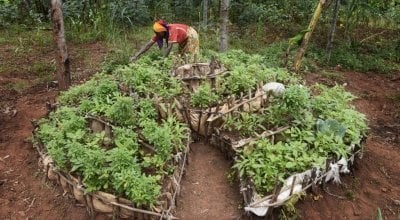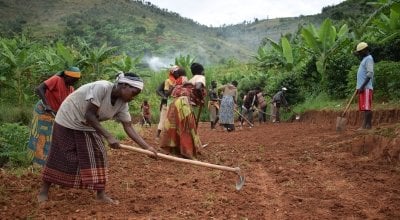
Knowledge Hub
One year on: Food in a Fragile World

This time last year we launched our Food in a Fragile World appeal; a fundraising initiative focusing on helping families in climate and conflict-affected countries get the food, water and healthcare that they need to survive. One year on, we take a look at the difference your donations – which were doubled by the Department for International Development thanks to the UK aid match scheme – have made to the lives of some of the world’s poorest people living in Burundi.
Burundi is one of the poorest countries in the world, where more than a third of the population doesn’t have enough food to eat. Poverty, political instability and scarce rainfall all contribute to high levels of food insecurity and hunger. And children, who make up around half the population, are disproportionately affected. In Cibitoke, an area with one of the highest levels of chronic malnutrition in the country, every other child living is chronically malnourished.
Fighting the irreversible effects of hunger
Hunger prevents children from developing. It causes stunting and weakens their immune systems making them more susceptible to diseases. Their ability to grow and learn is permanently damaged, and by the time they are just two years old, the effects of malnutrition are irreversible. That’s why, in Burundi (and, in fact, all of the countries we work in), the aim is to prevent malnutrition in the first place, or at least spot the early signs before it can take hold. And to do this, we target pregnant women and mums with young children. Mums like Clotilde.
Clotilde Ndayisenga is a proud mum of four from Cibitoke, Burundi, pictured here with her second youngest daughter, Ines (five).

“She’s energetic and bouncing with life,” says Clotilde as she attempts to squeeze a hug from Ines. “She loves to be involved in everything, especially helping to prepare food and cook. She's quick to learn." Cibitoke is thankful that Ines and her other children are growing up strong and healthy. She puts it down to a combination of a varied and nutritious diet and the help and advice of community-based health workers that are trained by Concern.
The Community Health Worker has told us the importance of having a balanced diet. We eat twice a day - mostly beans, corn, rice, cassava paste, sweet potatoes and vegetables.
Clotilde is among more than 55,000 families to benefit from health and nutrition advice and support from Community Health Workers and Care Group Volunteers in Cibitoke, Burundi, thanks to the funds raised – and matched – last year.
A highly effective approach
52-year-old grandmother Jeannette Icimanishatse is a Community Health Worker in Burundi.

She monitors families and refers any cases of severe acute malnutrition to the local health centre for treatment. Mothers whose children are moderately malnourished are enrolled in community-based nutrition classes where they receive advice on key feeding and care practices. They are also given support to build a kitchen garden which enables them to have vegetables all year round, and an opportunity to be part of a savings and loans scheme.
“I am proud of what I do. Mums depend on us for help. It is rewarding to know that we are doing something to make the life of the community better.”
Double the donations, immeasurable difference
Community-based programmes like these are a highly effective approach, according to Sebastien Sebahizi, Concern’s Health and Nutrition Programme Manager in Cibitoke, because they focus on behaviour change and peer-to-peer communication. Indeed, from stories like Clotilde’s, we can see first-hand the life-saving difference these programmes are making to the lives of the world’s poorest people.
The programme started in July thanks to funding raised by the Food in a Fragile World appeal. The public donated just over £850,000 which was matched pound-for-pound by the government. That matched funding is now being used in Burundi to help improve the lives of more than 58,000 under-fives at risk of malnutrition.
Lucy Bloxham
Digital Content Editor






